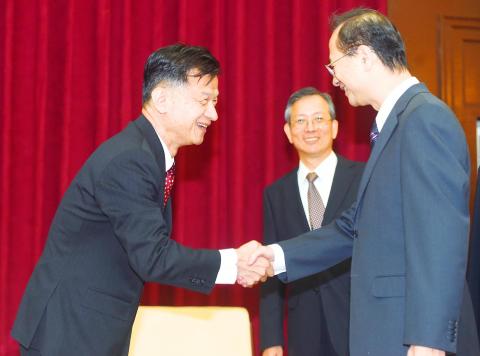Minister of Justice Chiu Tai-san (邱太三) yesterday announced a series of major reform initiatives to improve protections for plaintiffs and defendants in contentious cases. Chiu and Deputy Minister of Justice Chen Ming-tang (陳明堂) yesterday morning discussed the initiatives and how the Supreme Prosecutors’ Office and the Judicial Yuan could collaborate on a series of judicial reform programs.
The minister said he met with Judicial Yuan President Hsu Tzong-li (許宗力) and Vice President Tsai Chiung-tun (蔡炯燉), and received a positive response on working together to promote transparency. They agreed to set up regular communications between the two bodies.
“We know people are concerned about this issue. People have demanded openness in a system from which they feel excluded. There have been controversial court decisions and people feel disaffected by the justice system. Therefore, judicial reform shall be pragmatic, while changes and improvements should affect people’s lives in real ways,” Chiu said.

Photo: Liao Chen-huei, Taipei Times
Supreme Prosecutors’ Office Prosecutor-General Yen Ta-ho (顏大和) and Chiu presented a number of initiatives which had already been agreed upon by other judicial bodies that are to be implemented to launch the upcoming national affairs conference on judicial reform.
One of the measures is to improve protections for victims of crime and permit them to participate in the judicial process, which people have been demanding for many years, Chiu said.
“There is still some discussion to be had with the Judicial Yuan, but we are looking at granting rights, such as a victims’ right to access investigation documents and evidence, and their right to independently file an appeal on court decisions,” Chiu said.
“The objective is to promote victims’ rights to a higher level throughout the judicial process,” he added.
The ministry would enhance a program in which judicial officers advise people and advocate for their legal rights, so people can participate more effectively in court proceedings, Chiu said.
The ministry would also continue to implement “Restorative Justice,” Chiu said.
“We aim to bring offenders and victims together to talk and in this process, the offenders might come to understand the nature of their crime and how they have affected others,” Chiu said.
“From this process, offenders might come to sincere atonement and curtail the hatred brought on by crime, but at the same time, we must better protect victims, expedite financial compensation to them, and also provide them with the counseling and assistance they need,” Chiu added.
Another measure includes the Supreme Prosecutors’ Office setting up on “oral arguments and legal interpretation research” unit, which would automatically file appeals to the Supreme Court in cases that are of major concern to society and involve contentious legal issues.
Yen said this unit would also be tasked with selecting contentious legal cases to be bought for deliberation by the Supreme Court. In these cases the arguments, legal interpretations and decisions by judges would be published for public perusal to “open up” the judicial system and better meet society’s expectations.

Three batches of banana sauce imported from the Philippines were intercepted at the border after they were found to contain the banned industrial dye Orange G, the Food and Drug Administration (FDA) said yesterday. From today through Sept. 2 next year, all seasoning sauces from the Philippines are to be subject to the FDA’s strictest border inspection, meaning 100 percent testing for illegal dyes before entry is allowed, it said in a statement. Orange G is an industrial coloring agent that is not permitted for food use in Taiwan or internationally, said Cheng Wei-chih (鄭維智), head of the FDA’s Northern Center for

The Chinese military has built landing bridge ships designed to expand its amphibious options for a potential assault on Taiwan, but their combat effectiveness is limited due to their high vulnerability, a defense expert said in an analysis published on Monday. Shen Ming-shih (沈明室), a research fellow at the Institute for National Defense and Security Research, said that the deployment of such vessels as part of the Chinese People’s Liberation Army (PLA) Navy’s East Sea Fleet signals a strong focus on Taiwan. However, the ships are highly vulnerable to precision strikes, which means they could be destroyed before they achieve their intended

LOOKING NORTH: The base would enhance the military’s awareness of activities in the Bashi Channel, which China Coast Guard ships have been frequenting, an expert said The Philippine Navy on Thursday last week inaugurated a forward operating base in the country’s northern most province of Batanes, which at 185km from Taiwan would be strategically important in a military conflict in the Taiwan Strait. The Philippine Daily Inquirer quoted Northern Luzon Command Commander Lieutenant General Fernyl Buca as saying that the base in Mahatao would bolster the country’s northern defenses and response capabilities. The base is also a response to the “irregular presence this month of armed” of China Coast Guard vessels frequenting the Bashi Channel in the Luzon Strait just south of Taiwan, the paper reported, citing a

About 4.2 million tourist arrivals were recorded in the first half of this year, a 10 percent increase from the same period last year, the Tourism Administration said yesterday. The growth continues to be consistent, with the fourth quarter of this year expected to be the peak in Taiwan, the agency said, adding that it plans to promote Taiwan overseas via partnerships and major events. From January to June, 9.14 million international departures were recorded from Taiwan, an 11 percent increase from the same period last year, with 3.3 million headed for Japan, 1.52 million for China and 832,962 to South Korea,